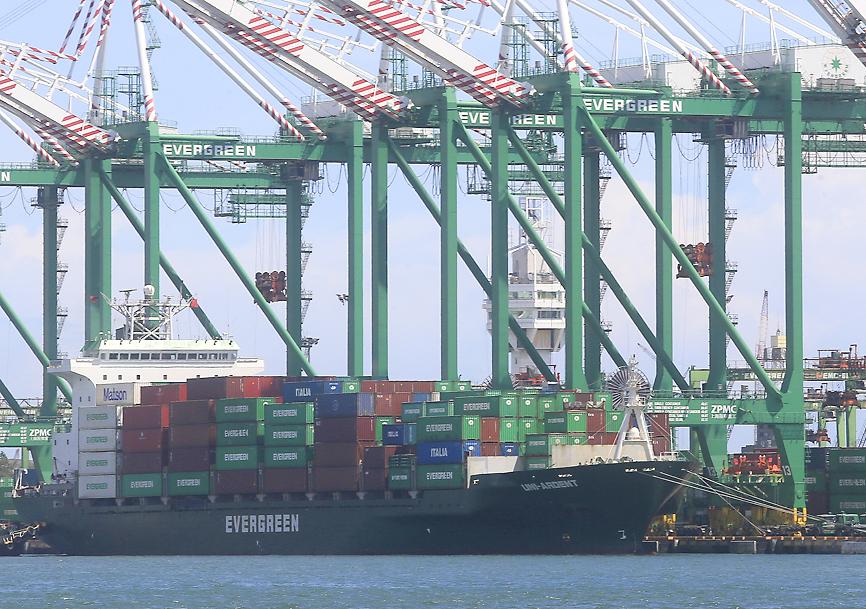Taiwan’s exports soared 11.2 percent year-on-year to a record US$32.23 billion last month, as tech firms continued to thrive on the low-contact economy, while most traditional sectors stopped being a drag, the Ministry of Finance said yesterday.
“The showing is surprisingly strong and might sustain this month and beyond, with demand for 5G devices, advanced chips and remote technology applications poised to gain steam ahead of the high season,” said Department of Statistics Director-General Beatrice Tsai (蔡美娜), who had earlier projected a mild decline for last month due to fewer working days and the disappearance of inventory stockpiling by China’s Huawei Technology Co (華為).
Bloomberg reported that excluding February’s data because of the extended Lunar New Year holiday, last month’s exports rose by the fastest pace since May 2018.

Photo: CNA
Exports are expected to rise by 5 to 8 percent this month, Tsai said, adding that the landscape moving forward looks bright for technology products.
The releases of Apple Inc’s new iPhones and other smartphone brands have been boosting business for local firms that supply their components, she said.
That helped explain why outbound shipments of electronics jumped 21.8 percent to US$12.97 billion, while information and communication products grew 22.2 percent to US$4.64 billion, Tsai said.
Those two categories are set to break records this year and would help avoid an annual decline in overall exports, she said.
Optical devices grew 14.2 percent from a year earlier, buoyed by strong demand for TV panels, which offset a 13.6 percent fall in shipments of smartphone camera lenses, the ministry’s report showed.
Exports of chemical, plastic and base metal products saw increases of 0.4 percent to 8.8 percent, reversing nearly two years of slumps after customers started to rebuild inventory, Tsai said.
The fledgling recovery did not apply to makers of mineral and textile products, which tumbled 61.3 percent and 6.9 percent respectively from their year-ago levels, as the COVID-19 pandemic slashed international travel and hurt their business, Tsai said.
Demand from all major trading partners worldwide picked up last month, lending support to a broad-based recovery, but Tsai said it is safer to watch for a while longer.
Exports to China and Hong Kong rose 16.9 percent, while shipments to the US increased 21.4 percent.
Imports fell 1 percent to US$24.77 billion, giving Taiwan a record trade surplus of US$7.46 billion, an 88.9 percent spike from a year earlier, the ministry said.
Imports of capital equipment rose 8.6 percent, mostly among local semiconductor firms seeking to maintain their global technology edge, the ministry added.
Widening trade surpluses are aggravating Taiwan’s trade imbalance with the US and driving up the New Taiwan dollar against the US greenback, but the NT dollar’s strength appears to have done little to temper overseas demand for Taiwanese products.
For the first 10 months of the year, exports totaled US$280.31 billion, a 3.4 percent increase over last year, dimming the chance of an annual drop for the major growth driver as forecast earlier by the government, Tsai said.
Imports maintained their retreat, slipping 0.8 percent to US$232.53 billion, weighed down by cheaper oil and raw material prices.
Additional reporting by Bloomberg

South Korea’s equity benchmark yesterday crossed a new milestone just a month after surpassing the once-unthinkable 5,000 mark as surging global memory demand powers the country’s biggest chipmakers. The KOSPI advanced as much as 2.6 percent to a record 6,123, with Samsung Electronics Co and SK Hynix Inc each gaining more than 2 percent. With the benchmark now up 45 percent this year, South Korea’s stock market capitalization has also moved past France’s, following last month’s overtaking of Germany’s. Long overlooked by foreign funds, despite being undervalued, South Korean stocks have now emerged as clear winners in the global market. The so-called “artificial intelligence

NEW IDENTITY: Known for its software, India has expanded into hardware, with its semiconductor industry growing from US$38bn in 2023 to US$45bn to US$50bn India on Saturday inaugurated its first semiconductor assembly and test facility, a milestone in the government’s push to reduce dependence on foreign chipmakers and stake a claim in a sector dominated by China. Indian Prime Minister Narendra Modi opened US firm Micron Technology Inc’s semiconductor assembly, test and packaging unit in his home state of Gujarat, hailing the “dawn of a new era” for India’s technology ambitions. “When young Indians look back in the future, they will see this decade as the turning point in our tech future,” Modi told the event, which was broadcast on his YouTube channel. The plant would convert

‘SEISMIC SHIFT’: The researcher forecast there would be about 1.1 billion mobile shipments this year, down from 1.26 billion the prior year and erasing years of gains The global smartphone market is expected to contract 12.9 percent this year due to the unprecedented memorychip shortage, marking “a crisis like no other,” researcher International Data Corp (IDC) said. The new forecast, a dramatic revision down from earlier estimates, gives the latest accounting of the ongoing memory crunch that is affecting every corner of the electronics industry. The demand for advanced memory to power artificial intelligence (AI) tasks has drained global supply until well into next year and jeopardizes the business model of many smartphone makers. IDC forecast about 1.1 billion mobile shipments this year, down from 1.26 billion the prior

People stand in a Pokemon store in Tokyo on Thursday. One of the world highest-grossing franchises is celebrated its 30th anniversary yesterday.